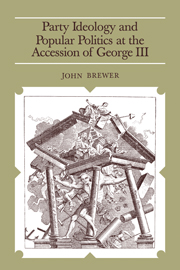Book contents
- Frontmatter
- Contents
- Preface
- A note to the reader
- PART I INTRODUCTION
- PART II THE RECONFIGURATION OF POLITICS
- PART III AN ALTERNATIVE STRUCTURE OF POLITICS
- PART IV FOCUSSED RADICALISM
- PART V TWO POLITICAL NATIONS
- 11 The politicians, the press and the public
- 12 The present discontents; party ideology and public unrest
- PART VI CONCLUSION
- Notes
- Bibliography
- Index
12 - The present discontents; party ideology and public unrest
Published online by Cambridge University Press: 15 December 2009
- Frontmatter
- Contents
- Preface
- A note to the reader
- PART I INTRODUCTION
- PART II THE RECONFIGURATION OF POLITICS
- PART III AN ALTERNATIVE STRUCTURE OF POLITICS
- PART IV FOCUSSED RADICALISM
- PART V TWO POLITICAL NATIONS
- 11 The politicians, the press and the public
- 12 The present discontents; party ideology and public unrest
- PART VI CONCLUSION
- Notes
- Bibliography
- Index
Summary
When I reflect on our constitution, I seem as it were to contemplate a game at chess, a recreation in which we both delight; For we have a king, whose dignity we strenuously defend, but whose power is very limited; the knights, and rooks, and other pieces, have some kind of resemblance to the orders of nobility, who are employed in war, and in the management of public affairs; but the principal strength is in the pawns or people; if these are firmly united they are sure of victory, but if divided and separated, the battle is lost.
(William Jones to Reviczki, April 1768, in Teignmouth (ed.), Memoirs of the Life, Writings and Correspondence of Sir William Jones (1804), 60–1)This Country, or the Inhabitants of it are become a disgrace to civil Society. Would to God! the Government of it was in such hands, as would risk any thing rather than permit the Mob to lord it over Us in this Manner.
When they have kicked both Houses of Parliament down Stairs, which we shall live to see happen, I suppose some Government will again be established in this Land.
(Rigby to Bedford, 4 August 1769, Bedford Mss. LVIII, f. 126)The combination of ministerial instability and public discontent made the 1760s one of the most volatile decades in the reign of George III. Seven ministries came and went, parliamentary opposition grew apace, the radical press burgeoned, and crowds became both more frequent and more prominent.
- Type
- Chapter
- Information
- Publisher: Cambridge University PressPrint publication year: 1976
- 1
- Cited by



